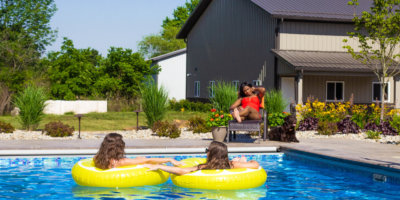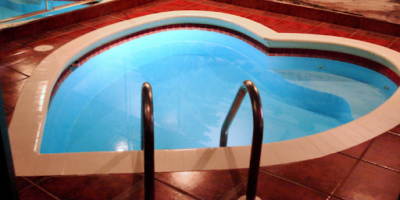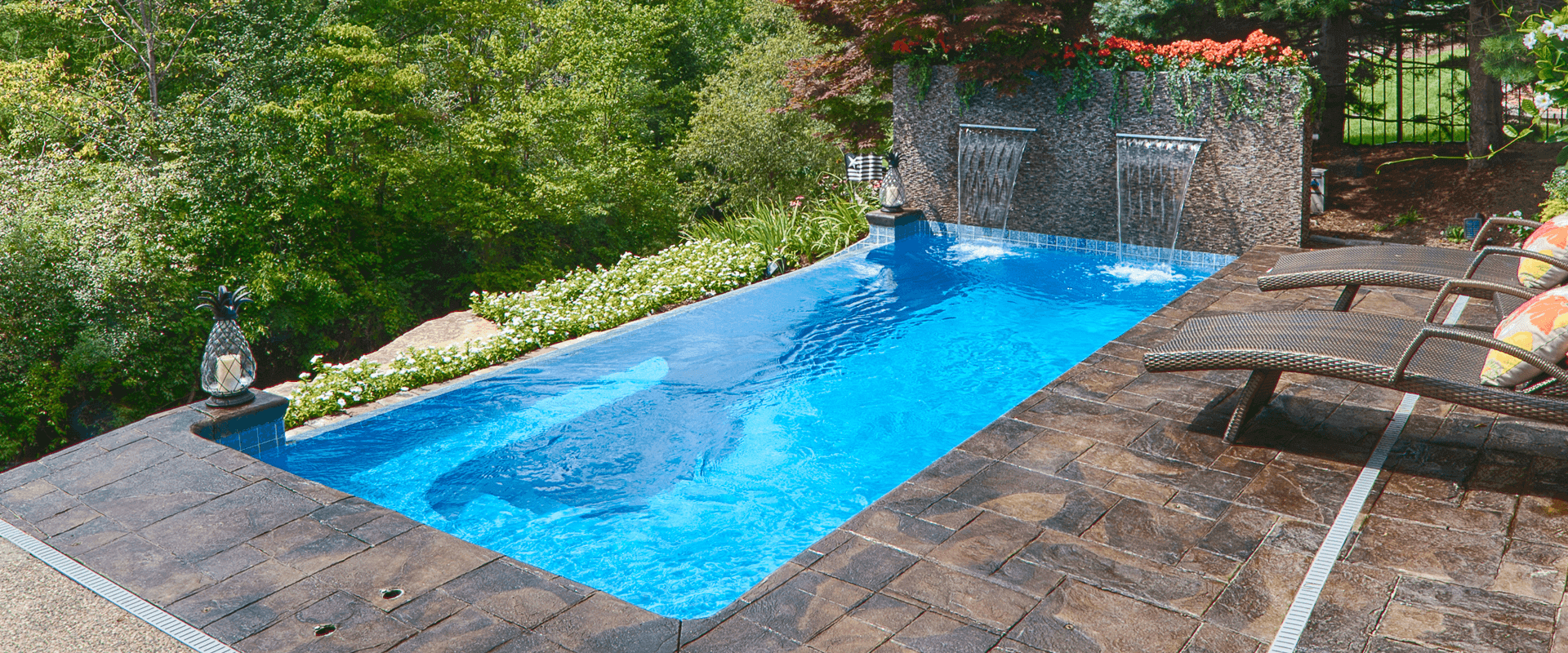877-929-7665
Choosing Between Gunite and Fiberglass? A Guide.
A GUIDE TO CHOOSING BETWEEN GUNITE AND FIBERGLASS.
Inground pools come in three different types—vinyl, gunite, and fiberglass—so determining what’s a right fit for you requires a little research. If you’ve arrived at the point where it’s a decision on fiberglass vs gunite (concrete), you’ve narrowed your decision tree a bit by throwing out vinyl as an option. This post will consider a concrete pool vs fiberglass pool to help you narrow your choices even further.
on fiberglass vs gunite (concrete), you’ve narrowed your decision tree a bit by throwing out vinyl as an option. This post will consider a concrete pool vs fiberglass pool to help you narrow your choices even further.
Buyer’s Checklist
The answers to the following questions can be differentiating factors of choosing a concrete vs fiberglass pool.
- How will your pool be used? Is it a party backdrop, a sunning platform, or the wet arena of countless epic splash-sport battles?
- Who will maintain the pool? If it’s you, what is the amount of time you’re willing to commit? If it’s someone else, what is the annual budget?
- How big a pool do you want or need? Do you want a particular size, shape, or feature?
- How much decking and landscaping?
- Who will use the pool? Will it include children and pets?
- Does your dealer provide a warranty and track record of installing durable pools?
About Concrete Pools
The first gunite pool was built in 1940. However, soon after, World War II stifled the industry. In post-war society, more homeowners started to purchase gunite pools. And today, depending on climate, gunite pools are still popular. For example, gunite pools can be more affordable in Florida and California, where the year-round temperature isn’t as extreme.
What are the Advantages of Concrete Pools
Gunite pool advantages lie in their customizability. For the pool buyer who wants to take an active hand in their pool design, gunite is often, but not always, the best option. Gunite pools are:
- Highly customizable. Concrete pools are built in various shapes, sizes, and depths. If you’re looking for a unique pool design (e.g., the shape of a guitar or a palm tree), a concrete pool is for you.
- Durable. Gunite pools are concrete! Like roads, sidewalks, and buildings, the walls and floor of a gunite pool are durable. While excessive surface cracks can cause staining, algae buildup, and calcium nodules resulting in the need to replaster, the surface is much stronger than vinyl liner pools.

What are the Disadvantages of Concrete Pools?
Aside from having a potentially higher upfront cost, the main disadvantages are the cost and time involved with maintaining the gunite and its plaster surface. The cost of ownership can catch some owners off-guard. Disadvantages of concrete pools are:
- Higher lifetime costs. As you’re doing your pool research, you’ll likely ask, “Are fiberglass or gunite pools more expensive?” Aside from various cost factors, including price differences in temperate climates, there’s not a big upfront price difference between the gunite and fiberglass pool cost. They both have mid-range costs from $45,000-$65,000. However, once you’ve bought the pool, you’ll have to maintain it. That’s when concrete pool cost becomes an issue for many buyers; the estimated 10-year maintenance cost of a gunite pool is about $20,000 or more compared to a fiberglass pool that has an estimated 10-year maintenance cost of around $5,750.
- Higher maintenance. When comparing fiberglass to gunite, one of the most important things to consider is how hard it can be to maintain the pool. People decide not to get a pool because they worry about maintenance and upkeep. If this is one of your concerns, consider that gunite pools require more maintenance than any other type of pool. If you own a concrete pool, you may spend around four to five hours per week on concrete pool maintenance compared to around one hour with fiberglass.
- Cracking. Have you ever noticed cracks on outdoor patios made of concrete? A pool is no different. As the earth moves, the concrete is not flexible, and instead of moving with the earth, the concrete cracks. This brittleness leaves you with expensive repairs and an undesirable finish to your pool. A fiberglass pool shell offers flexibility, helping to prevent damage when the earth shifts.
- Salt incompatible. Gunite is not the best move if you want a salt system in your pool. Salt gradually eats away at the cement finish as salt eats away a concrete driveway. If salt sits on the pool surface without dissolving, it can stain it in minutes. This salt damage also shortens the lifespan of the pool.
- Rough-surfaces. You most likely wouldn’t play volleyball barefoot on concrete. In the pool, it’s not much different! The rough surfaces can snag your swimsuit and be hard on your feet. Gunite can also hurt your pets’ joints and paws.
About Fiberglass Pools
 Fiberglass pools came into the swimming pool market in the 1950s and have tripled in popularity in the last 20 years. These pools have become a hot commodity due to innovative manufacturing techniques, easier installation, lower maintenance, and luxurious designs with unique features like zero-entry and tanning ledges! You can even choose fiberglass pool designs with a hot tub.
Fiberglass pools came into the swimming pool market in the 1950s and have tripled in popularity in the last 20 years. These pools have become a hot commodity due to innovative manufacturing techniques, easier installation, lower maintenance, and luxurious designs with unique features like zero-entry and tanning ledges! You can even choose fiberglass pool designs with a hot tub.
Advantages of Fiberglass Swimming Pools
Fiberglass pools have exploded with innovative shapes, features, and designs. The experience of installing and owning a fiberglass pool is one of pure pool enjoyment. It’s a bit of work, but the emphasis is on the fun. Fiberglass swimming pools are:
- Durable. (We’ll speak to our designs since we know them best). Our fiberglass pool shell is like a giant sandwich, the composite sandwich of awesomeness, made of 9 layers of different materials, including gel coat, fiberglass (chopped and woven), honeycomb core, and 100% vinyl ester barrier coat. Fiberglass specialists manufacture the shell in multiple layers, with each layer serving to maximize the strength and durability of the entire structure. The layers help the fiberglass withstand weather conditions while retaining flexibility and resisting cracking.
- Quick to install. Fiberglass pools go in easy and fast. Gunite pools can depend heavily on weather conditions and will roughly take three to six months to install, while fiberglass pools typically only take three to six weeks during non-busy seasons because they are pre-built on the mold and ready to go into the ground upon delivery!
- Usually paired with a lifetime manufacturer warranty. Concrete builders typically don’t have a manufacturer; therefore, they don’t have a manufacturer warranty. If any warranty comes with a concrete pool, it’s typically only a workmanship warranty by the builder. Most (but not necessarily all) fiberglass pool manufacturers ensure every pool purchased and installed is warranted not to leak due to structural failures caused by workmanship and material used in the manufacturing for the pool’s lifetime. If choosing a fiberglass pool, check with your independent dealer for the pool manufacturer warranty.
- The easiest pool to own. As mentioned before, the average time you will spend maintaining a fiberglass pool is only an hour or less per week. A fiberglass pool’s smooth, non-skid gel coat finish is 100 percent non-porous and non-reactive, so it doesn’t absorb chemicals or affect how they perform. Because the smooth gel coat makes fiberglass pools algae-resistant, you will use fewer chemicals in a fiberglass pool than you would a gunite pool. Fiberglass pools are also lower maintenance than other pool types, needing little more than essential vacuuming, skimming, and water testing. Less time and fewer chemicals mean fiberglass pool cost is lower on an annual basis.
- Smooth on the surface. The smooth gel-coat surface on our fiberglass pools won’t snag your swimsuit or cause scratches! Because the pool surface is smooth, a frequently asked question is, “are fiberglass pools slippery?” No, you won’t have to worry about the surface being too slick on steps or tanning ledges in our fiberglass pools, thanks to our proprietary process of producing a non-slip gel-coat for certain surfaces on each pool. The tanning areas, seats, steps, and safety ledges have this proprietary surface finish that provides a non-slip surface while still being easy on the skin and smooth to the touch.
Disadvantages of Fiberglass Swimming Pools
Fiberglass pools aren’t for everyone. Small fiberglass pools and medium-sized fiberglass pools come in various shapes and designs, but there are limits. The disadvantages of fiberglass pools are:
- They are limited in size options. A fiberglass pool is limited to the lengths, widths, and shapes installers can safely transport on the highway. Fiberglass pools generally can be a maximum of 16-feet wide and 40-feet long.
- They are less customizable. Fiberglass pool manufacturing requires pre-made molds, so pool designs are limited to what molds the manufacturer already has or is developing. Luckily, as fiberglass has become more popular, manufacturers have plenty of pool design options to choose from that will fit most yards and suit many lifestyles.
- They are not DIY. Fiberglass pools are not DIY-friendly. Fiberglass pools are hard to install for even the handiest of handymen. Fiberglass pool dealers have access to training, and they will have the equipment needed to complete the job without damaging the pool. Many people ask us, “Do fiberglass pools pop out of the ground?” Well, they actually can if they aren’t properly installed. Many fiberglass manufacturers do not sell directly to homeowners and sell only to an independent dealer network. The dealer installs your pool to the standards of the warranty.
If you are looking for a low-maintenance, fast-to-install, durable inground pool, fiberglass is a great way to go! If you’re interested in getting a fiberglass pool, the next step is to contact a dealer in your area and browse our pool designs to determine which is the best fit for your backyard oasis! If you want a quick ballpark estimate on the pool of your dreams, check out our pool cost calculator.
